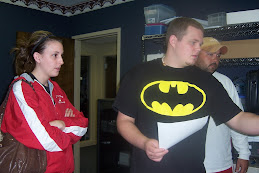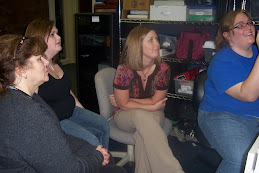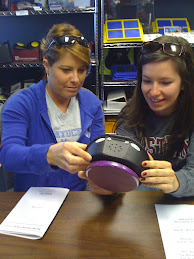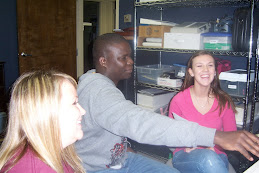Subscribe to:
Post Comments (Atom)
skip to main |
skip to sidebar

What is she saying to Elmo?

. . . from Batman. . . or Eric?

Wii or Something Like it

Figuring Out the Devices

But thinking about how to say, "Potato Chips!"

But What's So Funny?
Bluegrass Technology Fieldtrip
Here are photographs . . . there are more on Facebook.
I'm still learning names so if you want to do something fun or silly . . . - leave a comment under the photo with a creative caption and include the names that you know - this will help me BIG TIME!!
Obviously - totally optional
Thanks!
I'm still learning names so if you want to do something fun or silly . . . - leave a comment under the photo with a creative caption and include the names that you know - this will help me BIG TIME!!
Obviously - totally optional
Thanks!
Let's Play!

What is she saying to Elmo?
A Switch - A Message . . .

. . . from Batman. . . or Eric?
Words without Voice...

Wii or Something Like it
How many SED260 students. . .

Figuring Out the Devices
Playing with Toys

But thinking about how to say, "Potato Chips!"
Symbols & More Symbols

But What's So Funny?
Blog Archive
-
▼
2009
(325)
-
▼
February
(72)
- Reading Response
- questions and concerns
- countdown to post time!
- Thank you Mrs. White
- Posts due Friday??
- Language Project Meeting - SUNDAY at 6:00
- gain your awareness
- Test ?
- Lang. Assessment for the D/HH
- Josh's Question
- Monday Assignment
- Language Project - Analyzing Skills
- Language Project - MORE INFO
- Group assignment?
- Monday night students
- Wed nights class.
- Transitive, Intransitive, and Equative
- SAVING!!!
- Activities for Language Sample
- Case Closed
- Language Project
- Article Response
- Language Project
- test
- TEST!!!!
- Question for test
- Help The Teacher?
- Test 1
- Really Confused
- Test
- MLU
- Children stammer because of fear
- I am working on the test!
- Stammer
- Language Analysis Project
- Field Trip transportation
- Field Trip
- Test
- Mrs. White
- Mrs.White
- Test is open
- Monday Night Field Trip
- Wednesday Night's Class- TEST
- Study Group For Monday night class
- Study Group
- 1st Test
- Wed. Night Class
- Calculating MLU
- groups
- GUITAR
- The field trip
- Mrs. White's Dad
- Monday Night Class IS CANCELLED
- Prayers & Thoughts for My Family
- Late Saturday Night
- Wednesday night class
- Telling more
- Reflection of Wed. nights class.
- Help!
- I'm Back
- Morphemic Analysis in History Class
- I need to understand more
- This Week
- Reflecting on class today!
- Question?
- wed night class
- Different Models from Monday's Class
- Wed nights class!
- No title
- just a thought
- Two Weeks of No Class
- Hey
-
▼
February
(72)
The way I understood it was that in the intransitive clause, it is pretty much a very with nothing to specify it with. Like kicks or sings or runs. If there is just someone doing something (verb), then it is considered intransitive. Now, it changes to transitive if you, for lack of a better word, specify it. Like kicks the ball or sings the song or runs the marathon. I would not call it a description of the verb, but it is kind of a description of the sentence becasue it provides more information. This is called the object. It is the object of the very. It is what the verb is performing its aciton to. When she was describing the prepositions, just know that if it is a prepposition after the verb, then this does not count as the object and the phrase is still an intransitive sentence. I hope this is making sense. It is hard to explain in words. Finally there is the equative sentence and I understood this to mean that there is basically just something telling what the noun is, or giving it another name in a way. Like she said, candy is sweet. You are saying that the candy is sweet, not candy is sitting in the jar or something. It is basically saying another meaning for your main verb with a linking verb like "is" inbetween. I'm sorry if this doesn't help but I hope it does.
ReplyDeleteI have a decent understanding of what each is after class last night, but I will have to practice before I prepare my language assessment.
ReplyDeleteOk...not sure if this helps, but here goes. A transitive sentence has to have a direct object. For example, if the sentence says Joe plays the guitar, ask yourself, "Joe plays what?" If you can answer this question, then you have a direct object, thus giving you a transitive sentence. On the other hand, if the question cannot be answered, then it is intransitive. For example, Sally goes to the store is an intransitive b/c you cannot answer "Sally goes what?" For a statement to be an equative clause, the clause has to describe the noun. For example, "He is a doctor." He is the subject and doctor is describing what he is.
ReplyDeleteHopefully this makes sense.
Excellent, Jenny!!! Once you identify the verb if you can answer WHO or WHAT, then you have identified a direct object. If there is a direct object, it is a transitive sentence.
ReplyDeletethanks jenny for clearing it out to me. appreciated it!
ReplyDelete